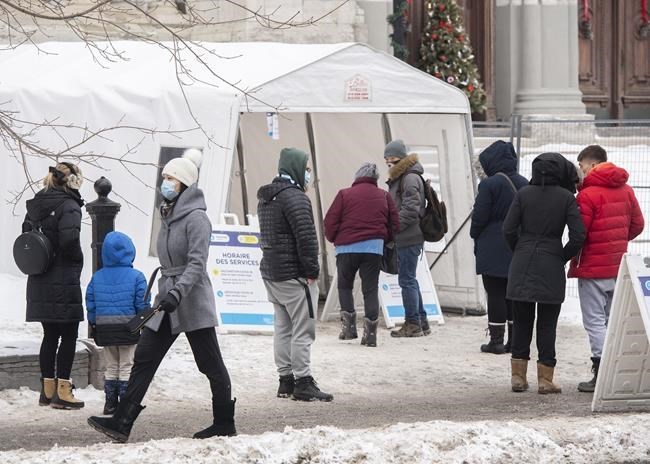Provinces are putting new measures in place to deal with an Omicron-fueled rise in COVID-19 cases and hospitalizations, including delaying in-person schooling in Ontario by two weeks and bringing in the military to help Quebec speed up its third-dose vaccination program.
Ontario joined a number of jurisdictions that already announced a postponed return to in-person learning, declaring the delay Monday along with a slew of new restrictions that puts the province back into a "modified Step 2" of pandemic recovery as of Wednesday.
Premier Doug Ford said in a news conference that virtual learning will replace in-person classes until Jan. 17. The news backtracked on an announcement made last week that in-person classes would resume this Wednesday.
"With the new variant, the ground is shifting every single day," Ford said. "The level of absenteeism we're seeing in other sectors tells us with absolute certainty that operating schools and ensuring teachers are on the job and not home sick will be a challenge we cannot overcome in the short term."
Ontario said 1,232 people were hospitalized with COVID-19 on Monday, including 248 patients in intensive care units.
The province reported 13,578 new COVID-19 cases, though experts have said the restricted eligibility for PCR testing Ontario announced last week means that number is likely much higher.
Newfoundland and Labrador also announced new restrictions Monday, placing the province in "Alert Level 4," as chief medical officer of health Dr. Janice Fitzgerald urged residents to keep non-essential contacts low.
The province's new plan, which includes further capacity restrictions at gyms and restaurants, will be re-assessed on Jan. 17.
Fitzgerald noted that active cases in Newfoundland have increased from 30 to nearly 3,000 in the last two weeks, adding that anyone with symptoms after close contact of a known case should forego a PCR test and assume they have the virus.
Newfoundland reported 519 new COVID-19 cases on Monday.
"At this point, the sheer number of cases is overwhelming public health capacity for case investigation," Fitzgerald said. "This means we do not have the epidemiological data to show where the spread is or is not occurring."
Meanwhile, Canada's public safety minister Bill Blair said on Twitter Monday that members of the Canadian Armed Forces will be deployed to Quebec to speed up the province's vaccination efforts. Quebec's booster program is set to expand Tuesday to those 18 and older.
In-person classes are already delayed until Jan. 17 in Quebec, where a curfew came into effect on New Year's Eve to help ease record-high cases.
The province reported 15,293 new cases on Monday. It also logged 1,396 hospitalizations, including 181 patients in intensive care, and 15 additional deaths.
Alberta, Nova Scotia and British Columbia all previously announced delays for the return of in-person learning, with a targeted Jan. 10 start date. Manitoba, which expected students to return on Jan. 6 following the holiday break, later extended that to the 10th.
But calls to delay that further have already begun.
The Manitoba Teachers' Society issued a statement Dec. 31 urging the province to move schools to "Code Red" status for the month of January, putting remote learning back into effect amid Omicron's rapid spread.
Ontario's lengthy list of what Ford called "targetted and time-limited" restrictions include reducing social gathering limits to five people indoors and 10 outdoors, closing indoor dining at restaurants and bars and shuttering indoor concert venues, theatres, cinemas and gyms.
Health minister Christine Elliott said the measures would be in place for at least 21 days, adding that the rapid rise of Omicron cases combined with a hospital staff shortage due to infection and exposure, could threaten hospital capacity "if further action isn't taken to curb transmission."
"As the evidence on Omicron continues to evolve, our pandemic response must evolve with it," she said.
Health officials in Nova Scotia reported 1,020 new cases of COVID-19 Monday, including 36 people in hospital. The province also expanded booster eligibility for those over the age of 30.
Top doctor Robert Strang said he was cautiously encouraged by the province's low hospitalization rate, but warned things could change quickly.
"Right now we can't justify a stricter lockdown, but nor can we justify throwing the doors wide open," Strang said, adding Nova Scotians could "accept a fair degree of spread" in order to continue seeing small groups of family and friends and attend school.
"However, we also have to work together to slow the spread of the Omicron variant to protect the vulnerable people in the health-care system."
COVID-19 activity has also been surging in Yukon, with the territory reporting 158 new cases since Friday and a 32 per cent test positivity rate.
Meanwhile, Supreme and provincial courts said they are postponing in-person trials in B.C. this week as they work with public health officials to update their COVID-19 safety policies.
In Alberta, new, shortened isolation measures began Monday. People with at least two doses of vaccine who test positive for COVID-19 only need to isolate for five days instead of 10.
The five-day isolation period is similar to recommendations recently announced in Ontario, Saskatchewan, Manitoba, New Brunswick and British Columbia. Symptoms must be fully resolved by the end of the five-day period, otherwise people must continue to isolate.
Federal Agriculture Minister Marie-Claude Bibeau tweeted Monday she had tested positive for COVID-19 despite spending the holiday season quietly at home.
Bibeau said she is following public health guidance and continuing to work virtually through her isolation.
"My symptoms are mild," she said. "I want to emphasize how important it is to get vaccinated and thank the health workers working hard to get us through this wave."
This report by The Canadian Press was first published Jan. 3, 2022.
Melissa Couto Zuber, The Canadian Press




